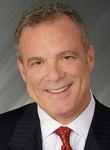Want trust? Be approachable, accountable, authentic
By Jay Wrolstad

Public opinion regarding corporate executives isn’t much better than that of America’s much-maligned Congress, but there are effective strategies for changing perceptions – and reality, said Mark T. Bertolini, MBA ’84, chairman, chief executive officer and president of Aetna, in the David J. BenDaniel Ethics Lecture on campus Nov. 14.
Bertolini spoke on “Re-establishing Trust in American Leadership” while offering his take on health care costs and their impacts on economies worldwide. “This is an important time in history. We have lost our heroes in business and government. We are struggling with who we are and where we are going, here and around the world,” he said, citing the Great Recession, gridlock in Washington and the threat of a government default.
Bertolini noted that a recent Gallup poll tracking levels of public confidence in institutions shows that big business is close to the bottom of the list, while small business is near the top. Congress is dead last.
“Why is there more confidence in small businesses? The CEOs of these firms are more approachable and more accountable,” he said. “In large corporations, these people tend to hide behind their PR firms and bureaucracy. People often don’t know who is in charge, and that breeds mistrust. You need to be approachable and authentic to establish integrity.”
Embracing social media outlets such as Twitter and Facebook helps him address this need, Bertolini said. “I interact daily with employees and customers. Leaders of the future cannot hide, which is different than it has been. We are way too connected today to lie and think we can get away with it.”
To establish leadership and trust, executives also must have courage, empathy, authenticity and a noble mission, he said. Aetna’s noble mission: “To save the world economy by creating healthier communities, healthier nations and a healthier world,” Bertolini said. “Health care is a global concern, and our mission is to make such care accessible and affordable.”
On the global front, the social contracts countries like France have signed to provide health care to their citizens are not sustainable. Nor is the program that enables Chinese citizens to pay about $40 per year for health care coverage, because of a rapidly expanding middle class, Bertolini said. Challenges in the United States are well known, with the new Affordable Care Act (ACA) aiming to meet them.
“Our health care system in the U.S. must be rebuilt – it hasn’t changed since 1945, does not meet the needs of consumers and is a major contributor to national debt,” said Bertolini. “ACA has opened a black box in the health care industry comprising managed care businesses. Everyone is building their own health exchanges. To succeed in this type of environment you must examine what you do well and reinvent yourself, if necessary,” he said.
The lecture was sponsored by the Samuel Curtis Johnson Graduate School of Management.
Jay Wrolstad is a freelance writer.
Media Contact
Get Cornell news delivered right to your inbox.
Subscribe